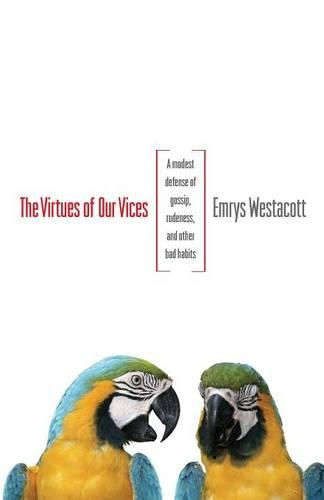
The Virtues of Our Vices: A Modest Defense of Gossip, Rudeness, and Other Bad Habits
(Paperback)
Publishing Details
The Virtues of Our Vices: A Modest Defense of Gossip, Rudeness, and Other Bad Habits
By (Author) Emrys Westacott
Princeton University Press
Princeton University Press
3rd February 2014
United States
Classifications
Tertiary Education
Non Fiction
Ethics and moral philosophy
170
Runner-up for New York Book Show Award 2012
Physical Properties
Paperback
304
Width 140mm, Height 216mm
369g
Description
Are there times when it's right to be rude Can we distinguish between good and bad gossip Am I a snob if I think that NPR listeners are likely to be better informed than devotees of Fox News Does sick humor do anyone any good Can I think your beliefs are absurd but still respect you In The Virtues of Our Vices, philosopher Emrys Westacott tak
Reviews
"General readers interested in how philosophy can be applied to daily life will gain much from this well-written book."--Library Journal "Westacott asks tough questions about the nature and meaning of these 'bad habits.' Arguing that conventional wisdom masks the benefits of practices often viewed as moral failings, he challenges us to engage 'with a world in which categories, terminologies, expectations, and norms are in constant flux.' His book is accessible, rigorous, and droll."--Glenn Altschuler, Boston Globe "In Westacott's microethical analyses, as with Socratic badinage, it's the process of inquiry, as much as the result, that engages the reader's interest. His tree-chart algorithms probably won't be that useful to anyone having to make a decision. But they reveal some of implicit choices that we often make very quickly when dealing with other people. The unexamined life may not be worth living, but it is, after all, where we spend most of our time. The Virtues of Our Vices shines a little light in that direction."--Scott McLemee, Inside Higher Ed "'The problem is not that people today are trampling underfoot the time-honoured rules of polite behaviour; the problem is that these rules are in flux,' Westacott writes. Rudeness is the price we pay for 'living in a dynamic culture'. That may not make it good, exactly, but it makes it an inevitable by-product of something many of us think of as good. Maybe that explains why critics of PC also bemoan the rise of rudeness: both complaints are reactions against change. A world with no rudeness, and no material for stories about 'PC gone mad', would be one that had come to a standstill."--Oliver Burkeman, The Guardian "After reading this volume, one might quibble with some of the author's observations, although next week one might feel differently. This is what Westacott recognizes as a 'fluid' situation, an essential aspect of the topic at hand. In sum, The Virtues of Our Vices presents a highly stimulating argument for our individual and collective self-evaluations."--James Naiden, Rain Taxi "Engaging, funny, and philosophically sophisticated, The Virtues of Our Vices challenges us to rethink conventional wisdom when it comes to everyday moral behavior."--World Book Industry "Westacott's work is relevant to the practice of philosophical counseling. It proves to be a collection of what we might call conceptual case studies insofar as it takes up mundane, morally loaded issues, and evaluates them philosophically... Works such as Westacott's can help counselors pinpoint and process some of these mundane interactions and judgments, to better enhance the client's critical thinking and quality of life. For the more examined life may after all be more worth the living. This work can also be helpful for philosophical practitioners in a corporate setting."--Graham Steers, Philosophical Practice
Author Bio
Emrys Westacott is professor of philosophy at Alfred University in Alfred, New York. His work has been featured in the New York Times and has appeared in the Philosopher's Magazine, Philosophy Now, the Humanist, the Philosophical Forum, and many other publications. He is also the coauthor of Thinking through Philosophy: An Introduction.
